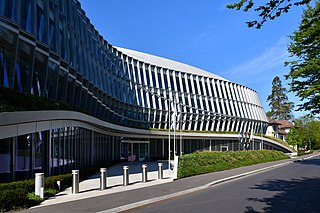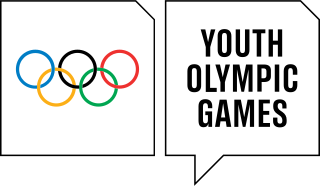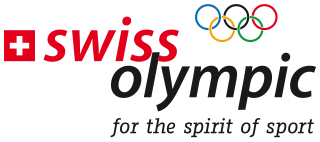
The International Olympic Committee is the international, non-governmental, sports governing body of the modern Olympic Games. Founded in 1894 by Pierre de Coubertin and Demetrios Vikelas, it is based in Lausanne, Switzerland. The IOC is the authority responsible for organizing the Summer, Winter, and Youth Olympics. The IOC also is the governing body of the National Olympic Committees (NOCs) and of the worldwide Olympic Movement, the IOC's term for all entities and individuals involved in the Olympic Games. As of 2020, 206 NOCs officially were recognized by the IOC. The IOC president has been Thomas Bach since 2013.
A sports governing body is a sports organization that has a regulatory or sanctioning function.
USA Ultimate is a not-for-profit organization that serves as the governing body of the sport of ultimate in the United States.

The Olympic Charter is a set of rules and guidelines for the organisation of the Olympic Games, and for governing the Olympic movement. Its last revision was on the 17th of July 2020 during the 136th IOC Session, held by video conference. Adopted by the International Olympic Committee (IOC), it is the codification of the fundamental principles, rules and by-laws. French and English are the official languages of the Olympic Charter.

The Canadian Olympic Committee is a private nonprofit organization that represents Canada at the International Olympic Committee. It is also a member of the Pan American Sports Organization.

The World Bridge Federation (WBF) is the international governing body of contract bridge. The WBF is responsible for world championship competitions, most of which are conducted at a few multi-event meets on a four-year cycle. The most prestigious championships are those for national teams in Open, Women, and Seniors categories: the Bermuda Bowl, Venice Cup, and Senior Bowl, and the quadrennial World Team Olympiads, incorporated in the World Mind Sports Games beginning 2008.

Olympism refers to the philosophy of the Olympic Games. The fundamental principles of Olympism are outlined in the Olympic Charter.
Global Association of International Sports Federations (GAISF) was the umbrella organisation for all international sports federations as well as organisers of multi-sports games and sport-related international associations. It changed its name to SportAccord from March 2009 to April 2017, when it reverted to its GAISF. It was an international sport organisation with 95 full members and 20 associate members.

The Association of National Olympic Committees of Africa is an international organization that unites the 54 National Olympic Committees (NOCs) of Africa. It is currently headquartered in Abuja, Nigeria. It serves as the successor to Standing Committee of African Sports or Comité permanent du sport africain founded in 1965 in Brazzaville, Republic of Congo.

The Youth Olympic Games (YOG) is an international multi-sport event for athletes between 15 and 18 years old, organized by the International Olympic Committee. The games are held every four years in staggered summer and winter events consistent with the current Olympic Games format, though in reverse order with the Olympic Winter Games held in leap years instead of the Games of the Olympiad. The first summer version was held in Singapore from 14 to 26 August 2010 while the first winter version was held in Innsbruck, Austria from 13 to 22 January 2012.
Raymond Gafner was an ice hockey player, referee, and a member of the IOC between 1969 and 1990.

The Olympic Cup is an award given annually by the International Olympic Committee.
The Bhutan Olympic Committee (BOC) was created on 23 November 1983 with the 4th King of Bhutan as its President, with its headquarters at Thimphu, Bhutan. Following this recognition, Bhutan participated for the first time in the 1984 Olympic Games held in Los Angeles when three men and three women archers represented Bhutan.

The Swiss Olympic Association is the National Olympic Committee and the umbrella organisation for organised Swiss sport under private law. It has 104 members, to which some two million people belong, practising sports in about 19,000 clubs. Swiss Olympic has its headquarters in the House of Sports in Ittigen near Bern. Swiss Olympic represents Olympic as well as non-Olympic sports and is a non-profit organisation. The big sports federations are divided into regional and cantonal associations. Former National Council member Jürg Stahl has been President since 2017. Roger Schnegg has been Director since January 2012.

The Russian Olympic Committee is the National Olympic Committee representing Russia. Its president is Stanislav Pozdnyakov. On 12 October 2023, the International Olympic Committee (IOC) suspended the membership of the Russian Olympic Committee.

The International Fair Play Committee, abbreviated as the CIFP or the IFPC, is a not for profit international non-governmental organisation which serves to foster sportsmanship in international competition. It presents awards annually at the World Fair Play Awards to recognise acts of fair play carried out by sportspeople or teams. The awards ceremony is held in France and has been broadcast on television in Europe.

The CSIT – International Workers and Amateurs in Sports Confederation is an international multi-sports organization. It was established as the successor to the Socialist Workers' Sport International and, as such, celebrated its centenary in 2013. The core principles of contributing to physical activity and sports have stayed in its action policy; upholding the right of men and women to do sports no matter what their professionalism levels are. The key concept of CSIT's sports policy has always been "Sports for all." The policy stems from the historical ideas of the international worker sport movement.
The International Centre for Sports Studies, known mostly by the initials CIES from the French Centre International d'Etude du Sport, is an independent, research and education organization, located in Neuchâtel, Switzerland. It has a research group called CIES Football Observatory that focuses on statistical studies of football-related matters.
Jean Presset was a Swiss footballer who played in the 1940s and 1950s as goalkeeper. Even during his active football career he focused on the youth football training of several clubs, these were FC Lausanne-Sport, FC Basel and BSC Young Boys. After his active football he became member of Panathlon International and in 2004 he was rewarded as an honorary member. Jean Presset was known commonly as "Monsieur Fair Play".

The International Testing Agency, often referred to by the acronym ITA, is an independent organisation constituted as a non-profit foundation which implements anti-doping programs for international sports federations, major event organizers or any other anti-doping organisation requiring support. The organisation was created in 2018 under the supervision of the World Anti-Doping Agency (WADA) and the International Olympic Committee (IOC) to promote independence, expertise and transparency in the global fight against doping. Its headquarters are located in the city of Lausanne in Switzerland.











